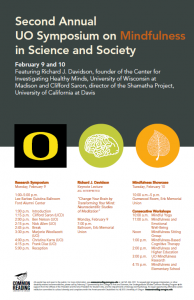Symposium Sessions [February 9, 2015 – Lee Barlow Guistina Ballroom, Ford Alumni Center]
1:00 pm Introduction
1:15 pm Clifford Saron, Minding Mindfulness: Findings and Issues in the Scientific Investigation of Contemplative Practice (UC Davis, Director of the Shamatha Project)
2:00 pm Ben Nelson, Parental Interpersonal Mindfulness Associated with Decreased Rates of Postpartum Depression (UO)
2:15 pm Nick Allen, Dispositional Mindfulness as a unique psychological strength: Clinical and neurodevelopment perspectives (UO)
2:45 pm Break
3:30 pm Marjorie Woollacott, Effects of Meditation, Tai Chi and Aerobics on Neural Activity Associated with Executive Attention (UO)
4:00 pm Christina Karns, A Grateful Mind: Relating Gratitude to Facets of Mindfulness (UO)
4:15 pm Frank Diaz, Mindfulness and Musical Processing: Theories, Evidence, and Questions from an Emerging Field (UO)
5:00 pm Reception
Mindfulness Showcase [February 10, 2015 – Gumwood Room, EMU]
Consecutive Workshops
10:00 a.m. Mindful Yoga with Kathryn Thier (UO)
11:00 a.m. Mindfulness and Emotional Well-Being with Tyan Taubner (UO)
Noon Mindfulness Sitting Group with Robin Hertz (UO)
1:00 p.m. Mindfulness-Based Cognitive Therapy with Heidemarie Laurent (UO)
2:00 p.m. Mindfulness and Higher Education with Lisa Freinkel (UO)
3:00 p.m. UO Mindfulness Research with Cris Niell, Marjorie Woollacott and other UO researchers
4:15 p.m. Mindfulness and Elementary School with Tom Horn (Edison Elementary School)
The Symposium for Mindfulness and Society was created to highlight the research being conducted by UO faculty and graduate students on the neurological basis of mindfulness practices such as meditation, tai chi, and yoga. Meditation has long been associated with a sense of inner calm and physical relaxation. Researchers at the UO are now finding that meditation and mindfulness can lead to improved learning and attention as well as increased self-awareness, compassion, and introspection.
This year the symposium is highlighted by two guest speakers:

Change Your Brain by Transforming Your Mind: Neuroscientific Studies of Meditation
Richard J. Davidson
Ph.D., University of Wisconsin-Madison
Date: February 9, 2015
Time: 7 pm [EMU Ballroom]
Richard Davidson is a pioneering neuroscientist, founder of the Center for Investigating Healthy Minds at the Waisman Center, University of Wisconsin-Madison, and named by Time magazine as one of the world’s most influential people. Davidson is best known for his groundbreaking work in studying emotion and the brain. His bestselling book, The Emotional Life of Your Brain, was chosen as this year’s Undergraduate Studies Common Reading: a book given to all first-year students as a way of sparking conversation while introducing them to the UO’s rich community of researchers and scholars.
 Minding Mindfulness: Findings and Issues in the Scientific Investigation of Contemplative Practice
Minding Mindfulness: Findings and Issues in the Scientific Investigation of Contemplative Practice
Clifford Saron
Ph.D., University of California-Davis
Date: February 9, 2015
Time: 1 pm [Lee Barlow Guistina Ballroom, Ford Alumni Center]
Clifford Saron is an Associate Research Scientist at the University of California-Davis and Director of the Shamatha Project — a large-scale collaborative and multimethod longitudinal study of the effects of intensive meditation training. The Saron lab uses qualitative, self-report, behavioral, electrophysiological, and biochemical measures to begin to elucidate the many levels of personal and physiological change that accompany such training.
The Davidson lecture is sponsored by the College of Arts and Sciences, the Undergraduate Studies Common Reading Program (with support from the Offices of the President and the Vice President for Student Life), and the Departments of Biology and Psychology. All events are free and open to the public. For sign language interpreting or other disability-related accommodations, please call 541-346-1221 before February 2nd. Davidson’s lecture will be ASL interpreted.
For info or questions about the Symposium or the Common Reading, please contact 541-346-1221 or vpugs@uoregon.edu.
